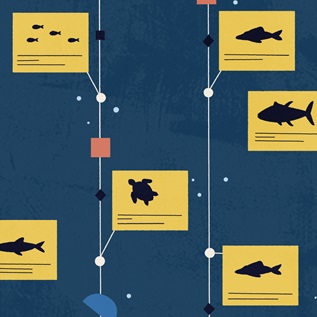As the Ocean Heats Up, Governments Should Prepare for Future Climate Changes
At U.N. meeting, it’s time for countries to agree to the adaptive management needed to keep fisheries sustainable

With ocean temperatures at their hottest ever, it’s hard to ignore the impact climate change has already had on marine biodiversity and fisheries. Fish populations are moving to cooler waters, coral bleaching has increased and algal blooms are larger and more frequent than ever. When coupled with overfishing, still the largest problem facing the ocean, the future for some of the world’s most valuable and ecologically important species is being threatened.
Although the regional fisheries management organizations (RFMOs) responsible for managing valuable international fisheries have started recognizing the effects of climate change on their fisheries and initiated actions that consider its impacts in their management plans, they need to do more to conserve wildlife and sustain the fisheries that create tens of thousands of jobs and feed millions of people each year.
The meeting at United Nations headquarters in New York this week is an opportunity to spur further action. Parties to the United Nations Fish Stocks Agreement, which governs the “conservation and sustainable use” of globally shared fish stocks, will meet from 15-17 May to specifically discuss how warming oceans are affecting international fisheries and how best to respond. Pew has three major recommendations for RFMOs: Adopt climate adaptive harvest strategies for fisheries, transition away from single-species management to ecosystem-based fisheries management (EBFM) and enact reforms that address how climate change could increase illegal, unreported and unregulated (IUU) fishing.
Harvest strategies prepare fisheries for future ocean changes
Harvest strategies, which are also known as management procedures, are adaptive tools that can be designed to address the projected impacts of climate change in fisheries management. Harvest strategies are pre-agreed frameworks that use computer models to test a range of future scenarios for fisheries, including potential ocean temperature increases and stock movement; they are used to set long-term objectives for fisheries. For example, they should automatically adjust fishing limits based on population status and environmental variability, which takes the guesswork out of annual management negotiations. In regions such as the Pacific, where species like tuna migrate through the waters managed by the Inter-American Tropical Tuna Commission and the Western and Central Pacific Fisheries Commission, collaborative management and regional coordination can make harvest strategies even more effective by ensuring that the same rules are in place. This will be particularly important in the face of climate change, which is expected to cause fish to move from west to east across the boundary separating these management groups.
Climate change affects not only tuna populations, but entire ecosystems
As more RFMO-managed stocks transition to harvest strategies, EBFM is the next frontier. This method recognizes that fisheries do not happen in isolation and considers the health of the full ecosystem, including how fishing for one species can affect predator-prey relationships, non-target species and important habitats such as breeding and feeding grounds. With climate change moving fish stocks and affecting food supply, it naturally changes where fisheries are located and how managers govern them effectively. RFMOs are already adopting and implementing harvest strategies for tuna fisheries, but these can be strengthened by including EBFM and ensuring that as fishing and the ocean change, the wider ecosystems remain as healthy as possible despite warming.
Warming seas could lead to more illegal activity, so new strategies are needed
As fish move farther out of their traditional ranges because of climate change, fishers may have a harder time finding them or profiting from their catch. Commercial fishers may resort to cutting corners on crew safety or turn to IUU fishing to replace lost revenue. They may also encroach on coastal areas, depleting fresh catch for local people. RFMOs need to not only prevent overfishing but work to ensure that the practices and rules they put in place to prevent IUU fishing incorporate knowledge about how climate change could make some vessel operators and owners embrace illegal fishing in an effort to maintain short-term profitability. Sharing vessel tracking information along with transparency of vessel ownership and access agreements to fishing grounds could help fisheries managers better prepare for and address such challenges.
The changes facing the ocean and fishing are coming quickly, and fisheries managers need to prepare for the reality of what warming waters mean for fish populations and the industries that rely on them. Although rapid, large-scale emissions reductions are needed to avoid crossing ecological thresholds beyond which adaptation measures will no longer be effective for fisheries, there are still many steps managers can take in the face of the shifts already happening. The upcoming U.N. meeting is a critical opportunity to face reality head-on and commit to protecting the health and resilience of fisheries and the wider ecosystem.
Andrew Clayton, Grantly Galland, and Peter Horn are project directors working on Pew’s international fisheries project.
















